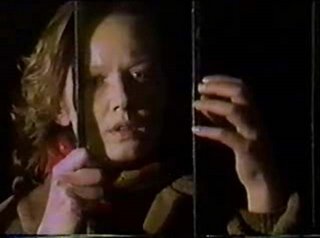Tangent: Delerue's score for Contempt is quite possibly my favorite film score ever. I realized this is because it is flowing, beautiful--a cascade of beautiful music. And there it is playing atop beautiful images (nude Bardot; glorious Cinecittà; the cliffs and the sea...), but the work of them in tandem is not to synthesize them into a tidy rapturous experience (a "great story," a "touching ode to movies," a "meditation") but to destroy, to remove us from the narrative flow, the fictive illusion, even the thematic itinerary. It's almost as if it's too much beauty, it's distracting, disorienting, our critical faculties are aroused from this excess and the shrewd disjunction Godard has wrought from it.
At any rate, Grandeur et décadence is a fantastic work, very much "80s Godard" so if you're game for it, please see this film if you can (even if on highly compromised digital forms). The cine-soul survives the medium translation, or in other words, the film's punch lands hard all the same (pixel bits hardly deflect it). Roman Polanski gets enough money for one of the characters ('Jean Almereyda'--Jean-Pierre Mocky) to make ten films. In reality a (non-)filmmaker should ask, too, why Godard gets money to make films ... but he himself, or she herself, doesn't. Godard is that rare cinematic voice constantly asking questions of access, privilege, and funding that still plague the medium of moving images, dividing it amidst the people.
A whiff of textual allusion: Almereyda, meanwhile, plays orpheus to his wife (named Eurydice [Marie Valera])--he wants to move back into the (Underworld of) history. Godard, in a cameo, puts it this way himself: perhaps cinema should be, or is, moving backwards. Eurydice's face may evoke the innocent visage of Dita Parlo (of L'Atalante and Grand Illusion), as characters in the film note ...




5 comments:
Love the use of Leonard Cohen's "The Guests" in Grandeur et decadence.
And then there's the bit from "Me and Bobby McGee"--including the repetition in the chorus,
"Freedom's just another word for nothin' left to lo--
Freedom's just another word for nothin' left to lo--
Freedom's just another word for nothin' left to lo--"
Hello, just wondering how did you find a copy of this film. I've found one in Emule, but it's just too slow.
hey there. i recently saw this on tv in france, and i am a big godard fan. Was wondering where you found the mpg. i can't seem to track it down and it's not out on video or anything of course (shame i couldn't record from tv)
Are you also a film producer?
Post a Comment